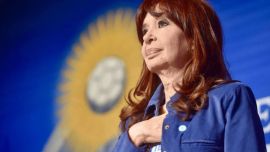Bolivia postponed its general elections on Thursday for a second time because of the coronavirus pandemic, putting it off until October 18, officials said.
The poll was originally supposed to be held in May but had been rescheduled to September 6 after the country went into lockdown following the virus outbreak.
The latest postponement comes just two weeks after interim president Jeanine Áñez tested positive for the Covid-19. Four cabinet members have also contracted the virus.
Salvador Romero, who heads the country's electoral court, said the decision to delay the elections again came after medical experts warned that Covid-19 infections would peak in Bolivia in late August or early September.
"The definitive date for the election gives better conditions for health protection, outside voting facilities and the arrival of international observer missions," said Romero.
A second round run-off –– should there be one –– would take place on November 29, the electoral court chief added.
The Catholic Church joined forces with conservatives earlier on Thursday to push for a postponement in response to a rise in coronavirus infections.
Bolivia, a country of 11.5 million people, has recorded more than 64,000 Covid-19 cases and more than 2,300 deaths from the disease.
The Movement for Socialism (MAS) party of former president Evo Morales, whose candidate Luis Arce led the most recent opinion polls, insisted that the election should go ahead in September.
But Romero said that "elections require the maximum possible security."
He acknowledged, however, that Bolivia was suffering from "serious polarisation" and that the reasons for Morales's resignation following his controversial win at the polls last October "have not disappeared."
Morales fled the country in November following three weeks of protests over his re-election to an unconstitutional fourth term.
He had tried to hold on to power but lost the backing of the country's military after an Organisation of American States audit found clear evidence of election fraud. That OAS verdict has since been questioned by some analysts.
Morales, who is currently living in exile in Argentina and is barred from standing in the general election, even as a legislator, described the decision as "a new blow to democracy."
"The de facto government wants to win more time to continue persecuting social leaders and MAS candidates," Morales charged on Twitter.
Former Senate vice-president Áñez assumed the interim presidency after Morales left the country, but her tenure –– originally intended merely as a stopgap until new elections could be organised –– has been criticised for dragging on and lacking legitimacy.
"It's another form of proscription. That's why they don't want elections on September 6," claimed Morales.
Arce was well ahead in the most recent opinion poll with 33.3 percent of voter intentions, versus centrist former president Carlos Mesa with 18.3 and conservative Áñez on 16.9.
The interim leader initially opposed the September date, favouring an election in October or November. But in June, she approved the earlier date after both chambers of Congress supported a bill proposing a September election.
Mesa expressed his "full support for the new date," adding that health security should be the priority.
To win outright in October's vote, presidential candidates need at least 40 percent of the vote plus a 10 point lead over the nearest challenger, otherwise the top two candidates will head to a second round.
– TIMES/AFP



















Comments